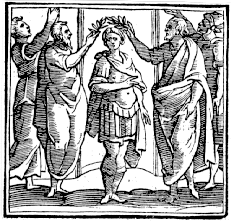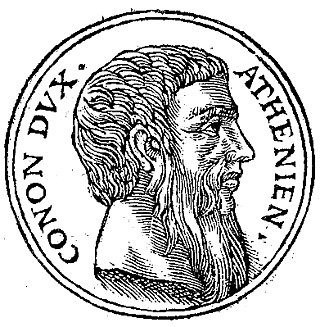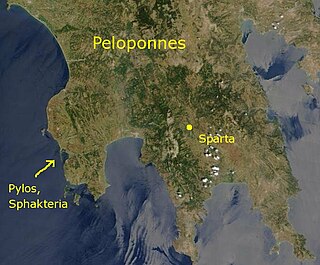Related Research Articles

The Second Peloponnesian War, often called simply the Peloponnesian War, was an ancient Greek war fought between Athens and Sparta and their respective allies for the hegemony of the Greek world. The war remained undecided until the later intervention of the Persian Empire in support of Sparta. Led by Lysander, the Spartan fleet finally defeated Athens which began a period of Spartan hegemony over Greece.

Lysander was a Spartan military and political leader. He destroyed the Athenian fleet at the Battle of Aegospotami in 405 BC, forcing Athens to capitulate and bringing the Peloponnesian War to an end. He then played a key role in Sparta's domination of Greece for the next decade until his death at the Battle of Haliartus.

Thrasybulus was an Athenian general and democratic leader. In 411 BC, in the wake of an oligarchic coup at Athens, the pro-democracy sailors at Samos elected him as a general, making him a primary leader of the ultimately successful democratic resistance to the coup. As general, he was responsible for recalling the controversial nobleman Alcibiades from exile, and the two worked together extensively over the next several years. In 411 and 410, Thrasybulus was in command along with Alcibiades and others at several critical Athenian naval victories.

Alcibiades was an Athenian statesman and general. The last of the Alcmaeonidae, he played a major role in the second half of the Peloponnesian War as a strategic advisor, military commander, and politician, but subsequently fell from prominence.

Conon was an Athenian general at the end of the Peloponnesian War, who led the Athenian naval forces when they were defeated by a Peloponnesian fleet in the crucial Battle of Aegospotami; later he contributed significantly to the restoration of Athens' political and military power.

Theramenes was an Athenian military leader and statesman, prominent in the final decade of the Peloponnesian War. He was active during the two periods of oligarchic government at Athens, the 400 and later the Thirty Tyrants, as well as in the trial of the generals who had commanded at Arginusae in 406 BC. A moderate oligarch, he often found himself caught between the democrats on the one hand and the extremist oligarchs on the other. Successful in replacing a narrow oligarchy with a broader one in 411 BC, he failed to achieve the same end in 404 BC, and was executed by the extremists whose policies he had opposed.
The Battle of Aegospotami was a naval confrontation that took place in 405 BC and was the last major battle of the Peloponnesian War. In the battle, a Spartan fleet under Lysander destroyed the Athenian navy. This effectively ended the war, since Athens could not import grain or communicate with its empire without control of the sea.

The Battle of Lade was a naval battle which occurred during the Ionian Revolt, in 494 BC. It was fought between an alliance of the Ionian cities and the Persian Empire of Darius the Great, and resulted in a decisive victory for the Persians which all but ended the revolt.
The Battle of Cyzicus took place in May or June 410 BC during the Peloponnesian War. During the battle, an Athenian fleet commanded by Alcibiades, Thrasybulus, and Theramenes routed and destroyed a Spartan fleet commanded by Mindarus. The victory allowed Athens to recover control over a number of cities in the Hellespont over the next year. In the wake of their defeat, the Spartans made a peace offer, which the Athenians rejected.

The naval Battle of Pylos took place in 425 BC during the Peloponnesian War at the peninsula of Pylos, on the present-day Bay of Navarino in Messenia, and was an Athenian victory over Sparta. An Athenian fleet had been driven ashore at Pylos by a storm, and, at the instigation of Demosthenes, the Athenian soldiers fortified the peninsula, and a small force was left there when the fleet departed again. The establishment of an Athenian garrison in Spartan territory frightened the Spartan leadership, and the Spartan army, which had been ravaging Attica under the command of Agis, ended their expedition and marched home, while the Spartan fleet at Corcyra sailed to Pylos.
The naval Battle of Cynossema took place in 411 BC during the Second Peloponnesian War. In the battle, an Athenian fleet commanded by Thrasybulus and Thrasyllus, although initially thrown on the defensive by a numerically superior Spartan fleet, won a narrow victory. This victory had an impact out of proportion to its tactical significance, coming when Athens' traditional democratic government had been replaced by an oligarchy and an Athenian defeat could have ended the war. The newly confident Athenian fleet proceeded to win two more victories in the Hellespont in quick succession, the second being the dramatic rout at Cyzicus, which ended the immediate Spartan threat to Athens' Black Sea lifeline.
The Battle of Arginusae took place in 406 BC during the Peloponnesian War near the city of Canae in the Arginusae Islands, east of the island of Lesbos. In the battle, an Athenian fleet commanded by eight strategoi defeated a Spartan fleet under Callicratidas. The battle was precipitated by a Spartan victory, which led to the Athenian fleet under Conon being blockaded at Mytilene. To relieve Conon, the Athenians assembled a scratch force composed largely of newly-constructed ships manned by inexperienced crews. The inexperienced fleet was thus tactically inferior to the Spartans, but its commanders circumvented the problem by employing new and unorthodox tactics, which allowed the Athenians to secure a dramatic and unexpected victory. Slaves and metics who participated in the battle may have been granted Athenian citizenship.
The Battle of Notium in 406 BC was a Spartan naval victory in the Peloponnesian War. Prior to the battle, the Athenian commander, Alcibiades, left his helmsman, Antiochus, in command of the Athenian fleet, which was blockading the Spartan fleet in Ephesus. In violation of his orders, Antiochus attempted to draw the Spartans into battle by tempting them with a small decoy force. His strategy backfired, and the Spartans under Lysander scored a small but symbolically significant victory over the Athenian fleet. This victory resulted in the downfall of Alcibiades, and established Lysander as a commander who could defeat the Athenians at sea.
The Battle of Abydos was an Athenian naval victory in the Peloponnesian War. In the battle, the Spartan fleet, under Mindarus, attempted to rescue a small allied fleet that had been driven ashore at Dardanus, but was attacked by the Athenian fleet, under Thrasybulus. The fighting was evenly contested for a great length of time, but towards evening, the arrival of Alcibiades with Athenian reinforcements tipped the balance in favor of the Athenians, and the Peloponnesians were forced to flee back to their base at Abydos, suffering heavy losses along the way.
The Battle of Mytilene was fought in 406 BC between Athens and Sparta. The Spartans were victorious.
Thrasyllus was an Athenian strategos (general) and statesman who rose to prominence in the later years of the Peloponnesian War. First appearing in Athenian politics in 410 BC, in the wake of the Athenian coup of 411 BC, he played a role in organizing democratic resistance in an Athenian fleet at Samos. There, he was elected strategos by the sailors and soldiers of the fleet, and held the position until he was controversially executed several years later after the Battle of Arginusae.
Mindarus was a Spartan navarch who commanded the Peloponnesian fleet in 411 and 410 BC, during the Peloponnesian War. Successful in shifting the theatre of war into the Hellespont, he then experienced a string of defeats; in the third and final of these, he was killed and the entire Peloponnesian fleet was captured or destroyed.

The Samian War was an Ancient Greek military conflict between Athens and Samos. The war was initiated by Athens's intervention in a dispute between Samos and Miletus. When the Samians refused to break off their attacks on Miletus as ordered, the Athenians easily drove out the oligarchic government of Samos and installed a garrison in the city, but the oligarchs soon returned, with Persian support.

The siege of Naxos was a failed attempt by the Milesian tyrant Aristagoras, operating with support from, and in the name of the Persian Empire of Darius the Great, to conquer the island of Naxos. It was the opening act of the Greco-Persian Wars, which would ultimately last for 50 years.
Astyochus or Astyochos was a Spartan navarch who served as commander of the collective Spartan naval forces along the coast of Asia Minor during 412–411 BC. He is regarded by many contemporaries and modern scholars as a key reason for Sparta's early failures in the Peloponnesian War. His expeditions consisting of encounters in Lesbos, Chios, Erythrae and Clazomenae all of which proved unsuccessful. He refused requests for help from Chios, causing the Spartan administration to become increasingly dissatisfied with his leadership. Thucydides portrayed Astyochus as timid and inept, and also depicted him as often in conflict with his peers in Ionia. Toward the end of his time as commander, he exhibited great reluctance to attack the Athenians and also failed to properly pay his troops, leading to riots and violence, and eventually, his removal as commander in 412 BC, to be replaced by the Spartan Mindarus.
References
- ↑ Lysias c. Agor. pp. 130—133)
- ↑ Robert Develin (2003-10-30). Athenian Officials 684-321 BC. Cambridge, UK: Cambridge University Press. ISBN 978-0-521-52646-3.
- Thuc. viii. 15, 16, 17, 30, 34, 38, 40, 55, 60, 61, 62, 79 ;
- The Fall of the Athenian Empire By Donald Kagan Page 51 ISBN 978-0-8014-9984-5
![]() This article incorporates text from a publication now in the public domain : Smith, William, ed. (1870). "Strombichides". Dictionary of Greek and Roman Biography and Mythology .
This article incorporates text from a publication now in the public domain : Smith, William, ed. (1870). "Strombichides". Dictionary of Greek and Roman Biography and Mythology .